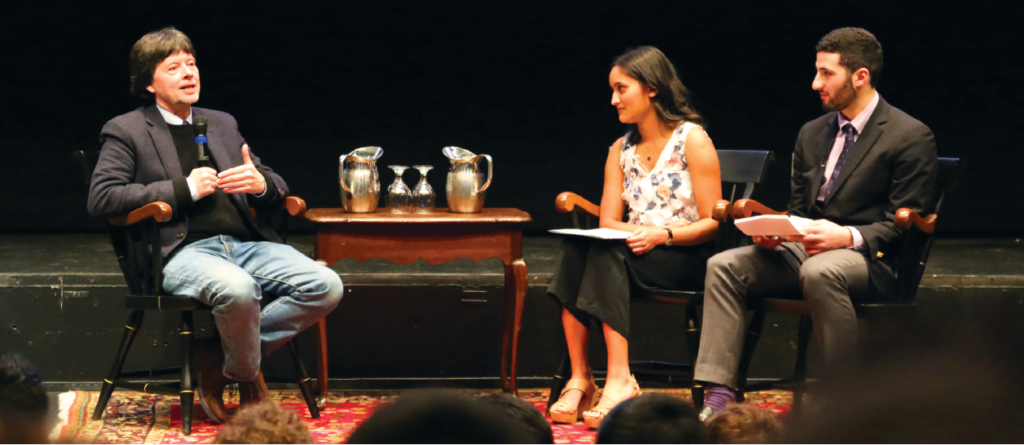Last Tuesday night, students and faculty hurried to the PMAC to see a riveting presentation from world renowned filmmaker Mr. Ken Burns. A part of the Ambassador S. Davis Phillips ’61 Family Lectureship, Mr. Burns was invited to campus to offer insight on his astounding documentaries and fascinating backstory. Last Tuesday night, students and faculty hurried to the PMAC to see a riveting presentation from world renowned filmmaker Mr. Ken Burns. A part of the Ambassador S. Davis Phillips ’61 Family Lectureship, Mr. Burns was invited to campus to offer insight on his astounding documentaries and fascinating backstory.
Mr. Burns was born in 1953 in Brooklyn, New York, and is well known on campus for an iMovie feature — the “Ken Burns effect.” However, aside from inspiring the tool that substantially increases the quality of Choate students’ history projects, Mr. Burns’s reputation truly lies in producing dozens of astonishing documentaries.
The program opened with a synopsis of Mr. Burns’s works, which featured clips from Brooklyn Bridge, The Civil War, Prohibition, Baseball, Jazz, The West, Cancer: The Emperor of All Maladies, and The Vietnam War.

On February 20, Elliot Sawyer-Kaplan ’18 and Ananya Karanam ’18 interviewed Ken Burns on the PMAC main stage. Earlier in the day, Burns spoke with students in the Sally Hart Lodge.
Prior to producing these films, Mr. Burns was a cinematographer for the BBC and worked for Italian Television. His first film, The Brooklyn Bridge, was inspired by David McCullough’s book The Great Bridge. The film eventually earned an Academy Award nomination for Best Documentary. Later, in 1985, Mr. Burns received an Oscar nomination for The Statue of Liberty. However, Mr. Burns’s success did not end there. In 40 years of making films, he has been awarded 30 honorary degrees.
Mr. Burns’s most recent work, The Vietnam War, was released in September, 2017. The introduction to the 18-hour series was showed during the program. Aside from the applause The Vietnam War received from students and faculty, it also garnered national recognition. According to Esquire, it is “perhaps the most definitive cinematic depiction of the complex and controversial topic.” The Washington Post said, “The experience of watching The Vietnam War includes terror, horror, disbelief, discovery, disgust, marvel, pride, ambivalence and tears.” The film critic and historian David Thomson called it “the best film I have ever seen.”
Bringing Mr. Burns to campus was largely the inspiration of Mr. John Connelly, a Choate HPRSS teacher, and Ms. Lorraine Connelly, the school’s Associate Director for Marketing and Media. The pair worked closely with Ambassador Phillips, the School’s Special Programs Committee, and Mr. Burns’s company, Florentine Films.
Before The Vietnam War was released, Mr. and Mrs. Connelly heard Mr. Burns speak about the documentary at a talk sponsored by the New York Times, in June of 2017. The Connellys decision to invite Mr. Burns to Choate was in large part due to Mr. Burns’s ability to channel his strong historical perspective into filmmaking. “Mr. Burns’s perspectives on historical sensibilities and his skillfully produced documentaries — particularly The Vietnam War series — figured significantly in our decision to invite Ken Burns to come to Choate Rosemary Hall,” Mr. Connelly said.
Mr. Connelly continued, “Without question, Mr. Burns’s documentaries provide uniquely palpable ways to encounter history, especially the different perspectives and voices that are important parts of the historical narrative.”
On the importance of Mr. Burns’s work, Mr. Connelly said, “Mr. Burns’s documentaries are all about revealing the fuller truths of history.” He continued, “Whether the subject is the Vietnam War, the Civil War, or Prohibition, that is, perhaps, the most enduring lesson that one can learn from his work.”
Mr. Burns has several ties to Choate. Choate alumnus Mr. Don MacKinnon ’86 is Mr. Burns’s digital curator. In addition, a current Choate parent, Ms. Sheryl Shade P’19, has known Mr. Burns for several years. Ms. Shade and Mr. Mackinnon helped coordinate Mr. Burns’s visit to campus.
During the program, Mr. Burns addressed a wide array of topics, from his latest film to the importance of exploring history.
Mr. Burns recounted his experience making the film and admitted that he was dumbfounded by the lack of knowledge he had prior to making The Vietnam War. “I was humiliated by what I didn’t know,” Mr. Burns said.
Additionally, Mr. Burns discussed his views on history. He explained to the community that although history doesn’t repeat itself, human nature does. This aspect of the program seemed to resonate with the community and become a topic of conversation among students and faculty.
Students left the PMAC in awe. Charlie Yockey ’19 said, “He exceeded my high expectations tenfold, and I was absolutely floored by his commentary at both the reception and during his lecture. He seems to be both a brilliant historian and documentarian — the full package.”
Yockey went on, “Furthermore, he is extraordinarily thoughtful about how he shares his stories and cognizant of the complexity of history. The respect he brings to the discipline amazes me, and I am so privileged to have had the opportunity to speak with him and learn from him. He is mindful of the impact his work has on the population and his energy was palpable; he truly cares.”
Ellie Latham ’18 agreed. “He was articulate, intelligent, funny, interesting, relevant — literally everything you can ask for in a speaker,” she said. “I think a lot of my peers were concerned that a historian might be boring, but they were 100% proven wrong. A lot of the time history gets a reputation for being not useful and relevant to the present day, and I think Ken Burns absolutely proved it wrong.”




